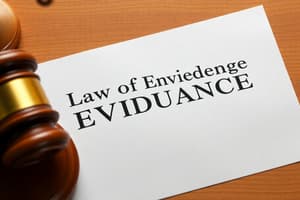Podcast
Questions and Answers
What is the standard of proof that is higher than preponderance of the evidence but lower than beyond a reasonable doubt?
What is the standard of proof that is higher than preponderance of the evidence but lower than beyond a reasonable doubt?
- Clear and convincing evidence (correct)
- Preponderance of the evidence
- Beyond a reasonable doubt
- Probable cause
What type of evidence is generally inadmissible in court?
What type of evidence is generally inadmissible in court?
- Hearsay evidence (correct)
- Circumstantial evidence
- Testimonial evidence
- Direct evidence
What is the process of verifying the authenticity of evidence called?
What is the process of verifying the authenticity of evidence called?
- Fruit of the poisonous tree
- Character evidence
- Witness impeachment
- Authentication (correct)
What is the preferred type of evidence according to the Best Evidence Rule?
What is the preferred type of evidence according to the Best Evidence Rule?
What is the process of attacking the credibility of a witness called?
What is the process of attacking the credibility of a witness called?
What is the primary purpose of the law of evidence?
What is the primary purpose of the law of evidence?
What type of evidence involves physical objects or documents directly related to the case?
What type of evidence involves physical objects or documents directly related to the case?
What is the standard of proof in civil cases?
What is the standard of proof in civil cases?
What is required for evidence to be admissible?
What is required for evidence to be admissible?
What type of evidence implies a fact or conclusion?
What type of evidence implies a fact or conclusion?
What is the standard of proof in criminal cases?
What is the standard of proof in criminal cases?
Flashcards are hidden until you start studying
Study Notes
Definition and Purpose
- The law of evidence is a set of rules that govern the process of presenting and evaluating evidence in a legal proceeding.
- Its primary purpose is to ensure that the court reaches a fair and just decision based on reliable and relevant information.
Types of Evidence
- Real Evidence: Physical objects or documents that are directly related to the case.
- Testimonial Evidence: Statements made by witnesses under oath.
- Documentary Evidence: Written documents, records, and other forms of recorded information.
- Circumstantial Evidence: Indirect evidence that implies a fact or conclusion.
- Direct Evidence: Evidence that directly proves a fact or conclusion.
Admissibility of Evidence
- Relevance: Evidence must be relevant to the case to be admissible.
- Materiality: Evidence must be material to the case to be admissible.
- Competency: The witness must be competent to testify.
- Privilege: Certain types of evidence, such as attorney-client communications, may be privileged and inadmissible.
Burden of Proof
- Preponderance of the Evidence: The standard of proof in civil cases, where the plaintiff must show that their claim is more likely than not.
- Beyond a Reasonable Doubt: The standard of proof in criminal cases, where the prosecution must show that the defendant's guilt is beyond a reasonable doubt.
- Clear and Convincing Evidence: A higher standard of proof than preponderance of the evidence, but lower than beyond a reasonable doubt.
Exclusionary Rules
- Hearsay: Out-of-court statements offered to prove the truth of the matter asserted.
- Character Evidence: Evidence of a person's character is generally inadmissible.
- Fruit of the Poisonous Tree: Evidence derived from an illegal search or seizure is inadmissible.
Other Important Concepts
- Authentication: The process of verifying the authenticity of evidence.
- Best Evidence Rule: The original document or evidence is preferred over a copy.
- Leading Questions: Questions that suggest the answer to the witness are generally not allowed.
- Witness Impeachment: The process of attacking the credibility of a witness.
Studying That Suits You
Use AI to generate personalized quizzes and flashcards to suit your learning preferences.




